
Road to Morocco is a 1942 American comedy film starring Bing Crosby, Bob Hope and Dorothy Lamour, and featuring Anthony Quinn and Dona Drake. Written by Frank Butler and Don Hartman and directed by David Butler, it’s the third of the "Road to ..." films. It was preceded by Road to Zanzibar (1941) and followed by Road to Utopia (1946). The story is about two fast-talking guys cast away on a desert shore and sold into slavery to a princess. In 1996, Road to Morocco was selected for preservation in the United States National Film Registry by the Library of Congress as being "culturally, historically, or aesthetically significant".

Blue Skies is a 1946 American musical comedy film directed by Stuart Heisler and starring Bing Crosby, Fred Astaire, and Joan Caulfield. Based on a story by Irving Berlin, the film is about a dancer who loves a showgirl who loves a compulsive nightclub-opener who can't stay committed to anything in life for very long. Produced by Sol C. Siegel, Blue Skies was filmed in Technicolor and released by Paramount Pictures. The music, lyrics, and story were written by Irving Berlin, with most of the songs recycled from earlier works.

Shirley Ross was an American actress and singer, notable for her duet with Bob Hope, "Thanks for the Memory" from The Big Broadcast of 1938. She appeared in 25 feature films between 1933 and 1945, including singing earlier and wholly different lyrics for the Rodgers and Hart song in Manhattan Melodrama (1934) that later became "Blue Moon."
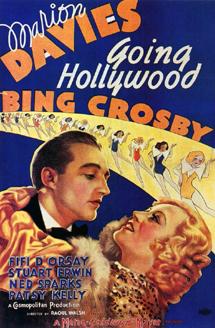
Going Hollywood is a 1933 American pre-Code musical film directed by Raoul Walsh and starring Marion Davies and Bing Crosby. It was written by Donald Ogden Stewart and based on a story by Frances Marion. Going Hollywood was released by Metro-Goldwyn-Mayer on December 22, 1933.

Variety Girl is a 1947 American musical comedy film directed by George Marshall and starring Mary Hatcher, Olga San Juan, DeForest Kelley, Frank Ferguson, Glenn Tryon, Nella Walker, Torben Meyer, Jack Norton, and William Demarest. It was produced by Paramount Pictures. Numerous Paramount contract players and directors make cameos or perform songs, with particularly large amounts of screen time featuring Bing Crosby and Bob Hope. Among many others, the studio contract players include Gary Cooper, Alan Ladd, Paulette Goddard, Ray Milland, William Holden, Burt Lancaster, Robert Preston, Veronica Lake, William Bendix, Barbara Stanwyck and Paula Raymond.

College Humor is a 1933 American pre-Code musical comedy film, directed by Wesley Ruggles, and starring Bing Crosby, Jack Oakie, Richard Arlen, Mary Kornman and Mary Carlisle. Based on a story by Dean Fales, the film is about a college professor and the school's star football player who become rivals for the same beautiful student. Released by Paramount Pictures, the film co-stars George Burns and Gracie Allen.
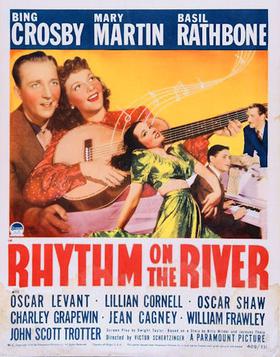
Rhythm on the River is a 1940 American musical comedy film directed by Victor Schertzinger and starring Bing Crosby and Mary Martin as ghostwriters whose songs are credited to a composer played by Basil Rathbone. Crosby and Martin sang "Only Forever", for which James V. Monaco (music) and Johnny Burke (lyrics) were nominated for the Academy Award for Best Original Song.

This is a filmography for the American singer and actor Bing Crosby.
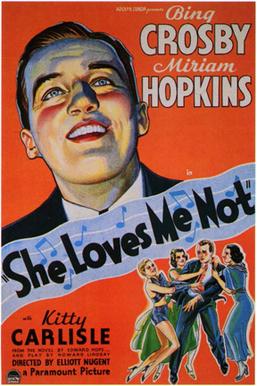
She Loves Me Not is a 1934 American comedy film directed by Elliott Nugent and starring Bing Crosby and Miriam Hopkins. Based on the novel She Loves Me Not by Edward Hope and the subsequent play by Howard Lindsay, the film is about a cabaret dancer who witnesses a murder and is forced to hide from gangsters by disguising herself as a male Princeton student. Distributed by Paramount Pictures, the film has been remade twice as True to the Army (1942) and as How to Be Very, Very Popular in (1955), the latter starring Betty Grable.
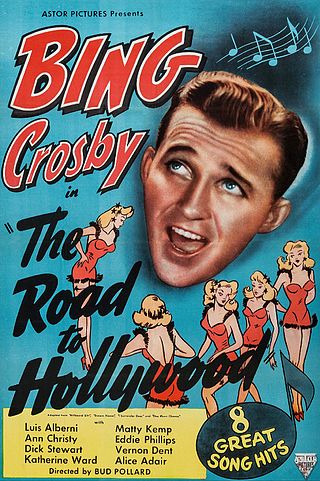
The Road to Hollywood is a 1947 American film released by Astor Pictures that is a combination of several of Bing Crosby's Educational Pictures short subjects. The title was designed to draft off Paramount Pictures' "Road to..." film series starring Crosby, Bob Hope, and Dorothy Lamour; Hope and Lamour do not appear in the film.

Here Come the Waves is a 1944 American romantic comedy musical film directed by Mark Sandrich. It stars Bing Crosby and Betty Hutton.
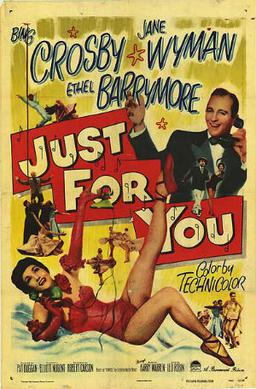
Just for You is a 1952 American musical film starring Bing Crosby and Jane Wyman and the final motion picture to be directed by Elliott Nugent. It was nominated for Best Song at the 1953 Academy Awards. The film was based on the book Famous by Stephen Vincent Benét. Filming took place between October 22 and December 20, 1951. It is said that Judy Garland had originally been sent a script as she was being considered for the female lead, but she apparently decided not to proceed with the project. Location scenes were filmed at Lake Arrowhead, near San Bernardino, California and at Big Bear Lake in the San Bernardino National Forest.

Here Is My Heart is a 1934 American musical comedy film directed by Frank Tuttle and starring Bing Crosby, Kitty Carlisle, and Roland Young. It is based on the play La Grande-duchesse et le garçon d'étage by Alfred Savoir.

One More Chance is a 1931 Educational-Mack Sennett Featurette starring Bing Crosby and directed by Mack Sennett. This was the second of the six short films Crosby made for Sennett and which helped launch his career as a solo performer. This film is notable for Crosby first singing on film his classic hit "Wrap Your Troubles in Dreams" which is sung to a bevy of giggling overweight Native American maidens who gradually close in on him. He also sings "Just One More Chance" which topped the various charts of the day in 1931.
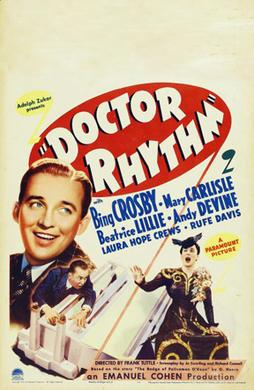
Doctor Rhythm is a 1938 American musical comedy film directed by Frank Tuttle and starring Bing Crosby, Mary Carlisle, Beatrice Lillie, and Andy Devine. Based on the 1907 short story The Badge of Policeman O'Roon by O. Henry, the film is about a doctor who pretends to be a policeman assigned as the bodyguard of a wealthy matron, whose beautiful niece becomes the object of his affections. The film features the songs "On the Sentimental Side" and "My Heart Is Taking Lessons".
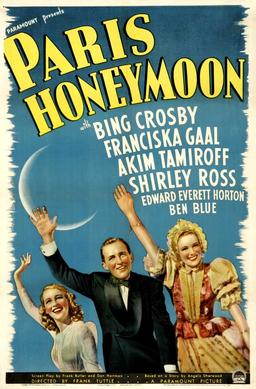
Paris Honeymoon is a 1939 American musical film directed by Frank Tuttle and written by Frank Butler and Don Hartman. The film stars Bing Crosby, Franciska Gaal, Akim Tamiroff, Shirley Ross, Edward Everett Horton and Ben Blue. Filming took place in Hollywood from May 23 to July 1938 and the film was released on January 27, 1939, by Paramount Pictures.

Please is a 1933 short musical comedy film directed and produced by Arvid E. Gillstrom. It stars Bing Crosby as himself along with Vernon Dent and Mary Kornman.
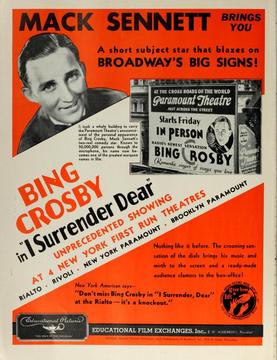
I Surrender Dear is a 1931 Educational-Mack Sennett Featurette starring Bing Crosby and directed by Mack Sennett. This was the first of the six short films Crosby made for Sennett and which helped launch his career as a solo performer.

Dream House is a 1931 Educational-Mack Sennett Featurette starring Bing Crosby and directed by Del Lord. This was the third of the six short films Crosby made for Sennett and which helped launch his career as a solo performer.

Blue of the Night is a 1933 Mack Sennett Star Comedy directed by Leslie Pearce and starring Bing Crosby. It was the last of the six short films Crosby made for Mack Sennett and which helped launch his career as a solo performer.




















